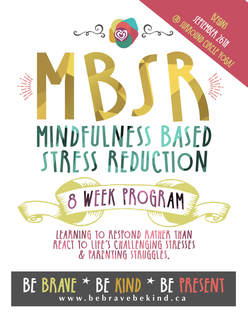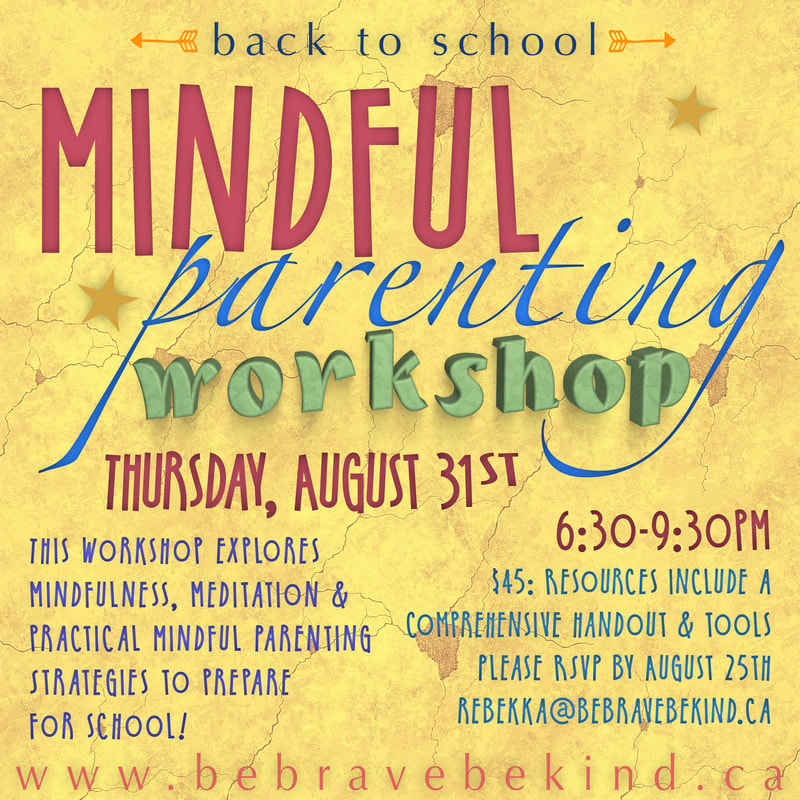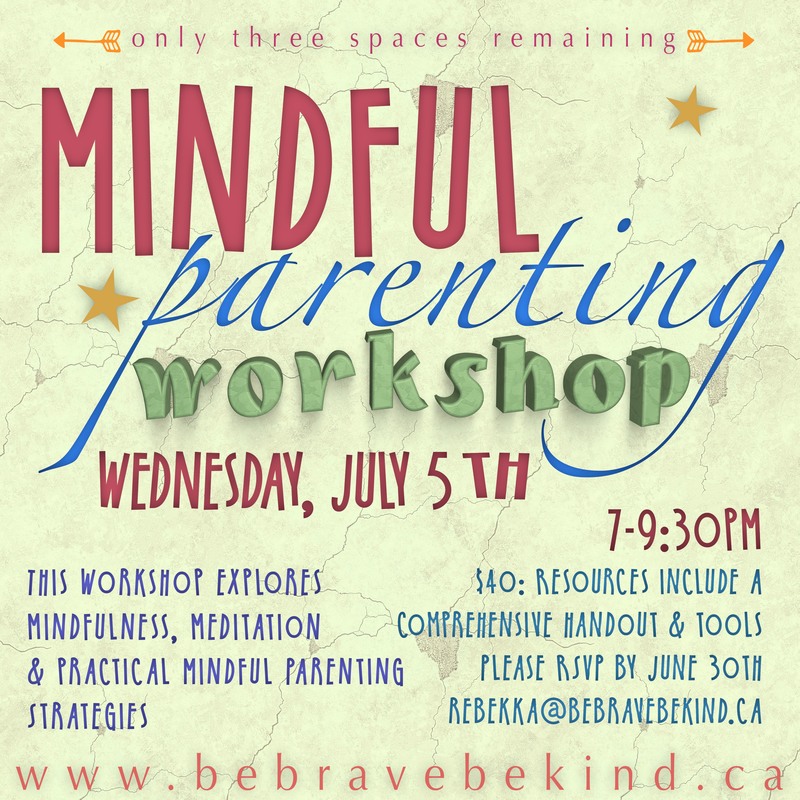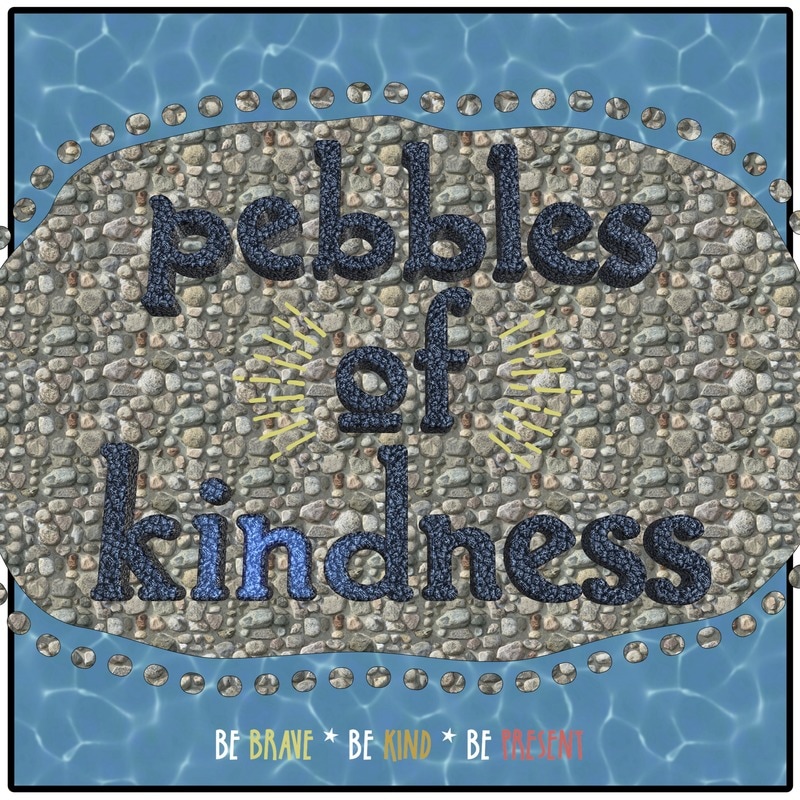 I've been doing some thinking as to why I love mindfulness as much as I do, and why I think that the MBSR course for parents and caregivers is such a helpful program. For myself, having taken 2 of these courses thus far, I have found the following benefits:
As for the text books and other online resources, here are some notable benefits from other participants: This 8 week course may change your relationship with:
In learning meditation and mindfulness, you can improve your: 1. Focus 2. Sense of well-being 3. Capacity for compassion to self and others 4. Parenting and communication skills 5. Relationship with others, including your kids, partners and colleagues! MBSR, designed by Dr. Jon Kabat-Zinn in the late 70s to help his clients with chronic pain, teaches stress management techniques through meditation, mindful moving, group process and experiential exercises. While the roots of MBSR are founded upon Buddhist practices developed 2500 years ago, it is a secular practice that integrates meditation with yoga inspired movements. The course incorporates practice and theory and over the course of 8 weeks you really begin to see how mindfulness can be applied in your daily experience. It also complements many psychological and medical treatments in relationship to pain, stress, anger and illness. Researchers have found that MBSR, when practiced regularly, provides lifelong strategies and is so much more than a band-aid solution to our suffering. Participants have reported having greatly improved coping skills, stress management, well being and physical/emotional/mental/spiritual health. If any of these benefits are of interest to you or if you are curious about the MBSR program, please contact me! I'd love to chat! MBSR: 8 week Program
3 Comments
If you have extended health benefits, your counselling sessions may be eligible for coverage. To find out, you can call your insurance provider (Great West life, Sun Life, etc), and with your plan ID and # in hand, ask the following:
1. Do you cover a Registered Social Worker? I am a Registered Social worker - license # 813393. I am also an MBSR Teacher Trainee with UC San Diego, Centre for Mindfulness, under the supervision of Gwen Morgan, MSW RSW (Certified Teacher in MBSR & MBCT with UC San Diego and the Centre for Mindfulness Studies, Toronto). 2. How much is covered? Most insurance companies will cover a percentage of counselling services offered by a Registered Social Worker. 3. What is the maximum amount paid per session or for the MBSR 8 week course? I charge $120 per counselling session and $480 for the MBSR course. Some insurance companies have a maximum rate. To ensure your complete coverage, please ask your insurance company for the maximum amount that they will pay per session. 4. Are there any deductibles? Insurance companies may require you to pay a deductible (e.g., 20% of the overall cost). 5. When does the coverage begin and end (i.e., January to December or fiscal year)? Most insurance companies provide an allotted amount of money over the course of one year. Please check with your provider when that time frame begins and ends to ensure that you have coverage. 6. How is payment received and/or reimbursed? I will provide you with a receipt that stipulates my Registration number (from the College of Social Workers and Social Service Workers (OCSWSSW) , as well as the name of my supervisor, Gwen Morgan, MSW RSW. You can then send your receipt in to your provider for reimbursement . Beginning to feel stressed about the "back to school" chaos? Looking for some strategies to bring calmness, connection and creativity back into your family space?
Please join me for our Mindful Parenting Workshop on Thursday, August 31st between 6:30-9:30pm. This workshop explores:
If you’re interested in participating in the workshop, please RSVP by August 28th. The cost is $45 per person and includes snacks, laminated tools, a calming jar and a comprehensive handout. Wishing you fabulously well and I look forward to hearing from you, Rebekka Reviews from the workshop so far:
I will be offering one last Mindful Parenting Workshop on Wednesday, July 5th between 7-9:30pm.
This workshop explores:
If you’re interested in participating in the workshop, please RSVP by June 26th. The cost is $40 per person and includes tea, cookies, laminated tools, a calming jar and a comprehensive handout. Wishing you fabulously well and I look forward to hearing from you, Rebekka Reviews from the workshop so far: “This was super practical and useful. Exceeded expectations. Would love to continue the conversation” “Loved the new “tools” for my box…:)” “Very thought provoking. Helped me connect the dots to and through other methods & tools I have explored. Excellent. Thank you” “Great info….Need more - Could keep talking for hours…Keep spreading the word” “Not long enough!” “I like the way Rebecca thought about everything!”
Here are some of the books I use to teach mindfulness to my kids at school (junior/senior kindergarten). I have many many more, but this is a good start for a Tuesday morning!
I will be updating this blog page regularly to add more of my favourite books. Definitely check back to see my new additions! xo r. After reading up on this topic, and having to make a decision for my own family, I've come to believe that spinners are a fabulous toy for some and an incredible tool for others.
What concerns me is that parents have bought into the fad and many of the kids who might benefit from other tools, such as meditation, increased recess, etc., are bringing their fidgets to class and disrupting others who might actually benefit from a stim tool, such as the spinner or cube. Further, for those in the "toy" category, these spinners can be highly distracting to others and teachers are having to make blanket rules about not having them in class; thus, harming those in the "tool" category. I think that kids can be taught that we have different needs and that those needs can be respected and accommodated. It doesn't mean we should all have access just because it's fair. My 2 cents. What are yours? Want to read more? Check out this interesting perspective on Fidgets: What the Fidget Spinners Fad Reveals About Disability DiscriminationAiyana Bailin Today, I presented to ~300 4-9 year old students about mindfulness. I closed my presentation by talking about ways we can proceed with kindness. I walked the students through the visual of tossing a pebble of kindness into the pond and the ripple effect that follows. It's a big concept for little people and one that requires some follow up.
Well, tonight I had the perfect opportunity! My son was shattered because we recycled his empty bottle and he decided, after we left, that he wanted to keep it. He cried and raged the entire walk home. Yet, we all responded using a kind but firm tone. Once he had calmed down (through connection), I spoke about the pebbles of poison and the pebbles of kindness. I reminded him about my presentation today (both of my boys were there) and we chatted about how his toxic emotions had a ripple effect on our family. I also highlighted how his brother, father and I worked very hard to respond with kindness. I then asked him if we wanted to throw in the "pebble of kindness" or the "pebble of poison" into tonight's bedtime "pond". He appeared to like this metaphor and chose kindness. Now, if he had chosen poison, I would have separated the boys and my littlest and I would have had our own story time while my partner would read to our eldest. As it was, we all read together and then they boys decided to lie together for their nightly meditation. Parenting success? We will see! Tomorrow, I will bring out our pebbles that I had been saving for painting and we'll paint them after school. To make this a more meaningful lesson, we will revisit the "pond" and kindness/poison concept again, and again, and again. Perhaps we will make a pebble for each emotion: Kindness. Anger. Joy. Hurt. etc. We can then create a home for our pond in my meditation corner, and when he's feeling a big emotion, we can see see what pebble he would like to toss into his pond. Then again. Maybe we'll just play outside! Teaching these concepts is a work on progress! What creative ways do you teach kindness to your children? At a recent Silent Retreat, Susan L. Woods offered us the phrase "parenting is your meditation". This resonates so much with me lately as I've been working early/late hours, solo parenting sick children, solo parenting healthy active children and simply working on maintaining as much balance as I can muster between 5am and midnight.
To find this balance, however, I have sacrificed my early morning meditation. And yet, I find it helpful to remind myself that this is only temporary. I am learning every day new ways for me to find "presence", "mindfulness" and "lovingkindness" throughout my day (albeit, in small but valuable snippets . And while my meditation isn't me sitting mindfully on my zafu along side my children (it's more like them trying to piggy back me while I'm frantically trying to finish the last 5 minutes of a guided meditation), I am learning how my children are my most powerful and rewarding teachers of presence, compassion, and lovingkindness. Parenting, messy and chaotic as it can be, is my meditation today, possibly tomorrow and definitely on Thursday. And so I send to thee, dear mamas, papas, & caregivers, some gentleness, cupfuls of compassion and a boatload of lovingkindness - in whatever form that may take. Today, these all came to me as I was hiking in the pouring rain with my son, hand in hand, and in blissful silence - listening to the rain falling on the forest leaves and watching the puddles dance. Where are you finding presence in your busy, chaotic, and messy worlds? I'd love to know! xo rebekka ps: This post was originally published on my Facebook page and inspired by Mindful.org image of the fantasy of meditating with children vs the reality of meditating with children! I was recently asked to write some reflections on mindfulness, and mom's with depression. Here are some of my thoughts on the matter:
Mindfulness: Mindfulness is about intentionally paying attention to the present moment with a kind, open and curious mind. It is a life long process that exercises our brain to make it stronger, manage stress, enhance creativity, improve decision making skills and keep us healthy. Moms living with depression may feel disconnected from their children, partners, bodies, and community. They may have thoughts that don’t make sense or be unable to concentrate. The very common experience of “mama rage” (uncontrollable anger towards your baby) is exacerbated by lack of sleep, insufficient resources and having too few coping skills to manage the very real stresses of parenting and managing a family. While meditation increases our ability to pay attention through intention and awareness, it’s not just about stress release and relaxation. Instead it’s an awakening, a zooming in on the present moment with the purpose of clarity and focus. It forces us to take time throughout our day for ourselves, to access our most powerful tool - the breath - and to put “us” first. Further, meditation invites us to focus on and unravel the mind/body experience. It asks us to see where we “feel” the emotion and how we “feel” the emotion. It encourages us to note the thought, and then take it a step further to tease apart the emotions and the sensations that underly the thought; thus, allowing us to see the experience with more clarity. This is particularly helpful for women who may feel like their thoughts are “controlling" or don’t make sense. Meditation also encourages us to let the experience pass through our minds without interference. We don’t push it away (if “uncomfortable”) or chase after it (if “positive” or “comfortable”). Instead, the thought comes and we gently bring ourselves back to the breath, noting it with an open and curious acceptance of “just what it is”. Focusing on the breath also helps us to break the cycle of rumination by concentrating our attention on the act of breathing in through our nose and out through our mouth. That cycle of focusing on our breath, losing attention ("wandering mind"), noting that we’ve lost attention and then gently, and without judgement, bringing our attention back to the breath is what helps us to strengthen our focus, concentration, and connection to body. If practiced over a long period of time, it can lead us to finding equanimity. 3 point plan for Mamas struggling with depression: 1: Connect with a compassionate community: Being a stay-at-home mom can be very isolating, add to this depression or anxiety and those feelings of isolation can feel unsurmountable. Connect with other moms through play groups or online - there are many resources out there for mom’s with PPD and anxiety. Regarding mindfulness, look at taking the 8 week MBCT (Mindfulness Based Cognitive Therapy) course. These courses, offered by therapists and mental health practitioners, will teach you the foundations of mindful meditation and have shown to be highly successful with helping people who struggle with depression and anxiety. 2: Practice compassionate parenting: Check out some of the incredible work from Carla Naumburg, Susan Stiffelman, Kristin Race, Susan K. Greenland, Eline Snel and Daniel J. Siegel. There are but a few of the authors that have been writing about Mindful Parenting and Mindful Therapy. Taken from my blog: “ The magic of the Pause and STOP - February 7, 2017 (http://bebravebekind.ca/bebravebekind.html): One of my favourite techniques learned throughout this journey has been to “STOP". In its most simple form, it asks that I: 1) Stop, 2) Take a Breath, 3) Observe how I’m feeling and, 4) Proceed (with kindness). If anything, practicing my “STOP” allows me the space to pause and reflect - respond instead of react. Taking a PAUSE, when the emotions start ramping up is a crucial part of being present and aware. That Pause is the magic. When things aren’t moving in the direction I need them to go (e.g., kids not listening, fighting, running around the house like lemurs on speed, etc.), I STOP. I put down the groceries or turn my back on the kids who are totally ignoring me after being told (insert ridiculous # here) times to quit what they’re doing. I take three long, deep belly breaths. I check in with myself, and think about where in my body my emotions are hitting me the hardest. Is the rage strongest in my belly? Is my head pounding? Are my fists clenched? I try not to judge or think of the why, but focus on the feeling or sensation in my body. And then, here is where the magic starts, I pause. Because once I’m aware of my body sensations, I have begun to gain back my power. I’ve now secured the control needed to take those next crucial parenting steps. And so, I breathe into that belly, the head, the fists and I work to relax the sensation. After that, it’s (almost) smooth sailing into the grand “P”. Proceed with kindness. I’m not going to lie, the kindness gig is hard. Especially when you’ve asked your child to pick up that toy for the umpteenth time, or when your kid calls you an “idiot” because he’s hurt or angry. But the kindness is important. It’s a reminder that my job is to model behaviour - to share with my children the skill of self control, discipline (in the form of teaching and natural consequences) and to respond to hurt with love.” 3: Be compassionate to your self: As a mom, we often put everyone else first. However, when our "spirit bowls" are empty, we have nothing to offer others. Filling our bowls through self care, such as meditation, mindful moving (yoga), massages, sleep, coffees with friends, date nights with your self or partner, courses, exercise, sleep, healthy meals, appropriate medications, therapy, etc., are all strategies that allow us to take better take care of our children and families. Finally, finding the right supports (i.e., doctors and mental health practitioners can make all the difference. If you suffer from depression, please contact your mental health practitioner prior to engaging in meditation. Supervised meditation allows you to fully appreciate the experience within a safe space and with appropriate guidance. For more information about MBCT, please see the following links: http://mbct.com http://www.goodtherapy.org/learn-about-therapy/types/mindfulness-based-cognitive-therapy http://mbpti.org/mbct-mindfulness-based-cognitive-therapy/ I absolutely support the "no digital parent shaming" movement. But I also support providing parents and children with alternative options, resources and information for digital parenting. I mostly support this because I need all the help I can get!
I am completely guilty of checking my devices throughout the day while my children are ... awake, mostly because my office is my phone and my business is at home. Finding balance between parenting and work from home is a daily battle and one that I'm still trying to negotiate. My kids, meanwhile, have access to little screen time and are doing an excellent job filling their days without screens. Seriously, this lack of balance is all on me! So to manage this, let me share some of our family rules about technology: 1) No screens at the table (breakfast, lunch AND supper) 2) No TVs in the bedroom 3) Family movie night is Friday night - it's a very special night! 4) Mama's iPad is for meditating (access to headspace), research and music - kids cannot use it unless they ask permission 5) Mama's phone is not a toy and is not to be used by any children. 6) No phone calls while driving (when kids are in the car). 7) Wii fit and movies are for gross rainy days, not sunny happy days. 8) Children cannot have any screens in their bedrooms (unless used for meditation). What we're working on: 1) No phones/ipads/computers in the bedroom. 2) Checking texts/emails/facebook/blog posts before 7am, between 9:30-3pm, and after 8pm is A-Okay. 3) Trying to be flexible with ALL the rules listed above - we're a family that is growing and evolving, and sometimes we need to watch Grey's Anatomy while lying in bed and sometimes on sunny days, our kids need to watch Paw Patrol. Our goal is to make it the exception... not the rule. How about yourselves? How are you working with technology in your world? ps: The best thing we ever did was to stop watching TV for a year. Need some inspiration? Check out this post: december-15th-2016.html |
Welcome to my blog!This is a space to visit, learn, share and explore what it is to be Mindful and a Mindful Parent. Thank you so much for coming to learn with us! Categories
All
Archives
June 2021
|
Photo from torbakhopper




 RSS Feed
RSS Feed